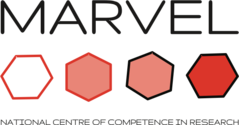This repo contains the Docker file used in the AiiDAlab.
Docker images are available from Dockerhub via docker pull aiidalab/aiidalab-docker-stack:latest.
See aiidalab/aiidalab-docker-stack for a list of available tags.
To launch a local instance of AiiDAlab, first clone this repository, e.g., with
git clone https://github.com/aiidalab/aiidalab-docker-stack.git
cd aiidalab-docker-stackand then install the Python requirements needed to run the manage script:
pip install -r requirements-manage.txt
Before starting AiiDAlab, it is recommended to configure it for your needs.
For example, to mount the AiiDAlab home directory on your local host at ~/aiidalab instead of using a Docker volume, execute:
./manage.py configure --home-dir=~/aiidalabThis creates a .env file in the local directory that stores the provided settings.
You can then launch your local AiiDAlab deployment with:
$ ./manage.py upYou should see output similar to this:
Starting AiiDAlab (this can take multiple minutes) ...
Open this link in the browser to enter AiiDAlab:
http://localhost:8888/?token=be20d9872d...
Note: AiiDAlab will keep running until you shutdown or restart the host computer, in which case, you will have to run the up command again to restart AiiDAlab.
Please see ./manage.py --help for a full list of available commands.
For a local development deployment, run
./manage.py --develop upThis will build and start an image where the aiidalab package, the aiidalab-widgets-base library, and the aiidalab-home app are installed with their latest development versions instead of their latest release versions.
The manage.py script uses docker-compose to manage the local AiiDAlab deployment.
Please see the AiiDAlab documentation for information on how to use and deploy AiiDAlab docker images in alternative ways.
Users of AiiDAlab are kindly asked to cite the following publication in their own work:
A. V. Yakutovich et al., Comp. Mat. Sci. 188, 110165 (2021). DOI:10.1016/j.commatsci.2020.110165
This work is supported by the MARVEL National Centre for Competency in Research funded by the Swiss National Science Foundation, as well as by the MaX European Centre of Excellence funded by the Horizon 2020 EINFRA-5 program, Grant No. 676598.

